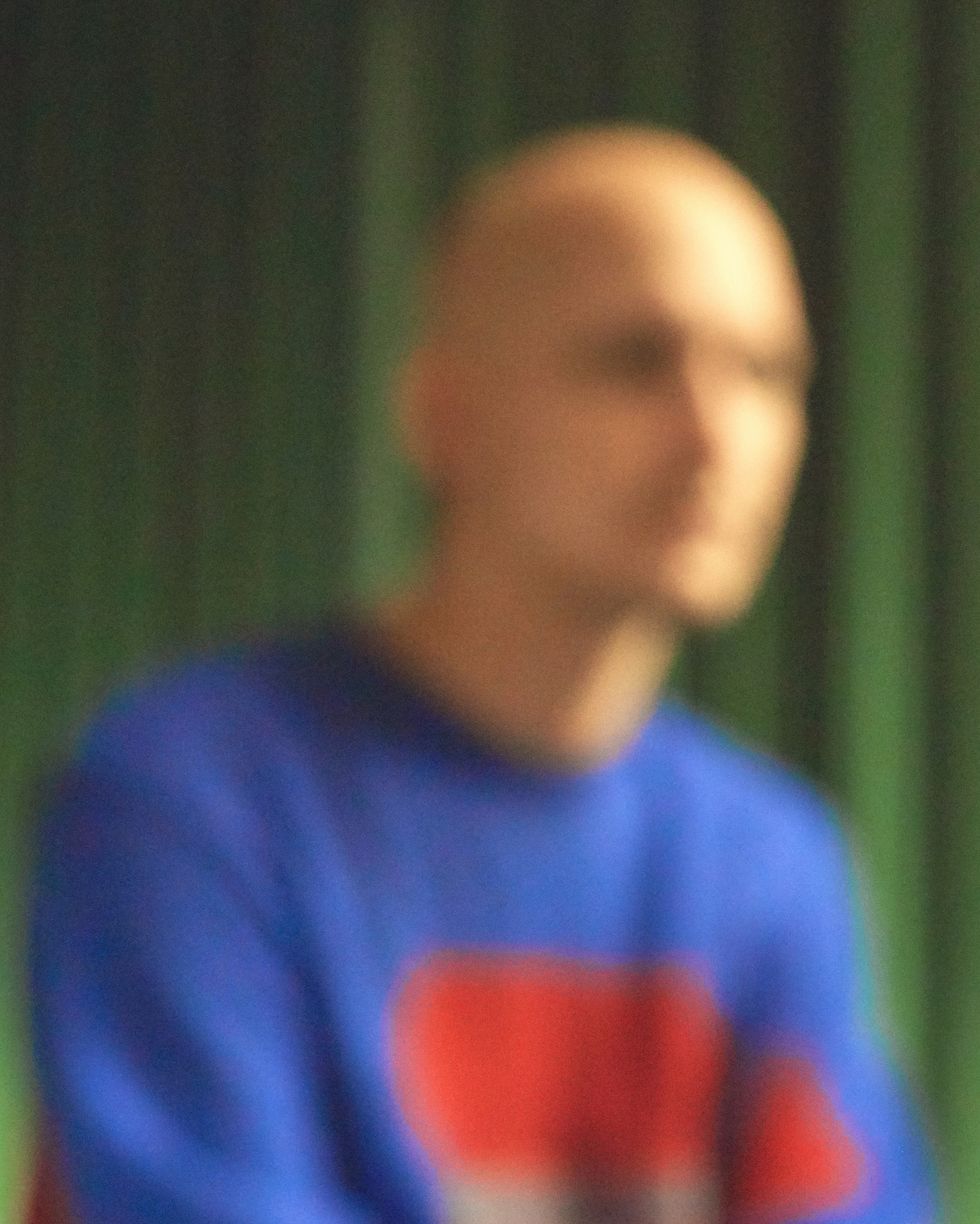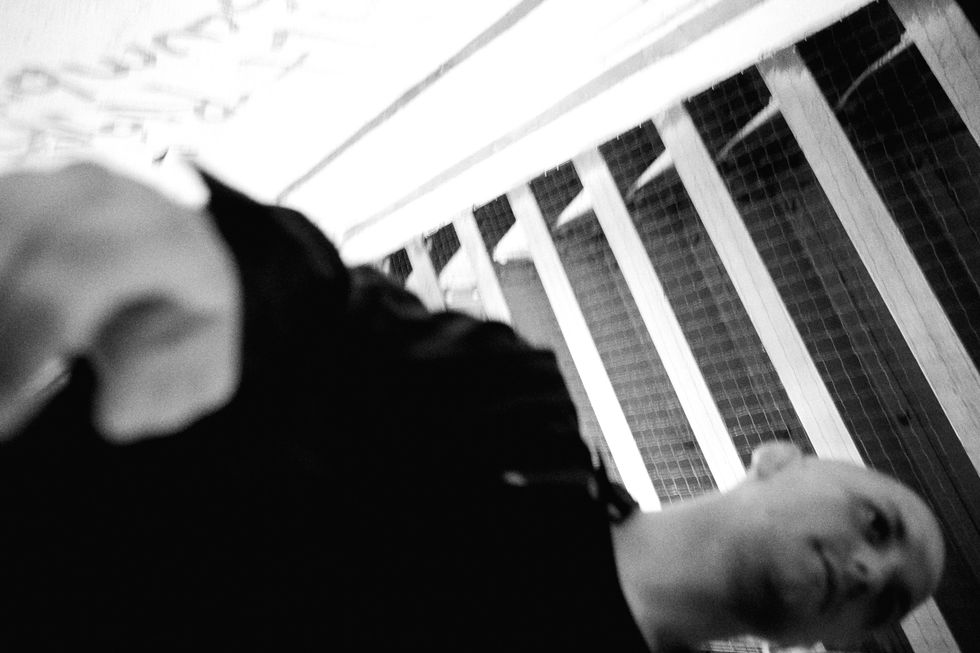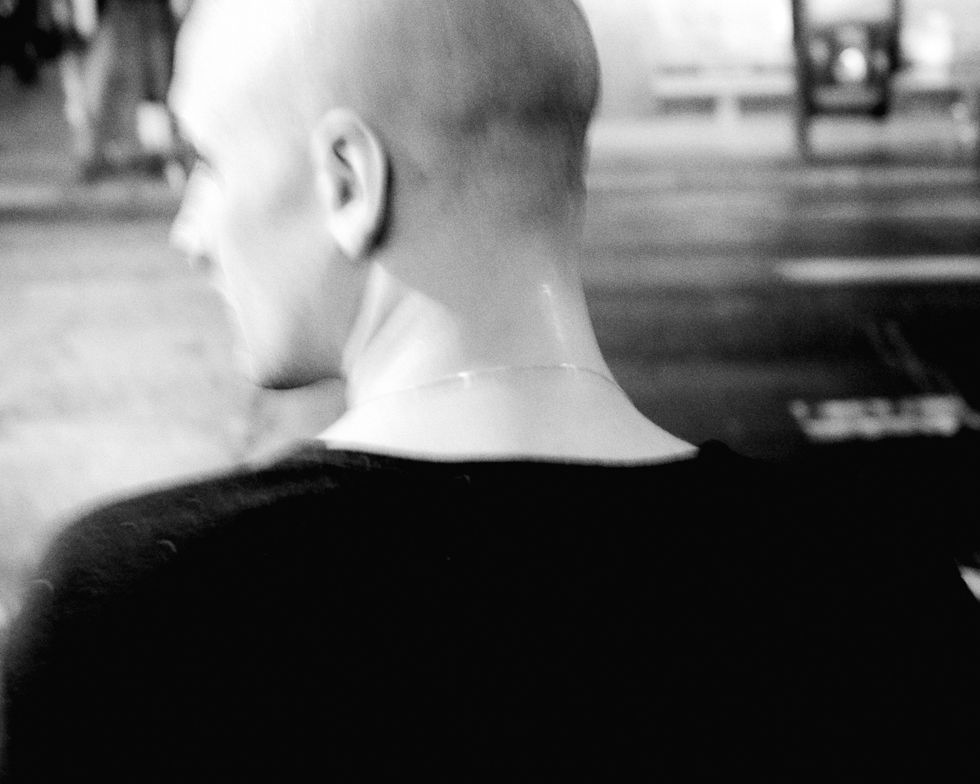
According to Russian superstition, the odds of winning the lottery are far greater than those of a bird pooping on your head. Meaning, unexpected excrement can only be a sign of good luck. But as a pigeon perched above Canadian DJ/ producer Jacques Greene suddenly dive bombs him outside a NoHo La Colombe midway through our interview, it's clear that the old adage is merely used as a consolation tactic. A couple of napkins later — along with a change in venue — and Greene is back in high spirits.
Two nights later at National Sawdust, I become convinced that I'm a jinx for Greene as two-thirds of the way through his set, a fire alarm forces his crowd out onto the Williamsburg streets. It's an interruption that would likely kill any momentum made, even for the most seasoned of performers. But if it phased Greene, he doesn't let it show. Instead, after getting the all-clear from the fire marshals, he quite literally hops back on stage without missing a beat and builds the energy right back up with his edit of Frank Ocean's "White Ferrari." On any other night that track would have served as Greene's finale, a euphoric crescendo to cap the evening, but tonight it was Greene's way of re-establishing the room, connecting the vibes and inviting us back into the totality of his vision.
Greene's sophomore studio album, Dawn Chorus, is best experienced in one continuous sitting. From the opening sirens of "Serenity" to the sky-gazing monologues of "Stars," each track almost imperceptibly slides into the next as Greene lets the energy swell and decompress as he sees fit. The album has its peaks, like the early aughts, acid-tinged sermon of "Night Service," or the samba grooves of "For Love," but it is how Greene bookends those highlights with interludes and understated R&B-leaning numbers that make them shine all the brighter.
Moreso than any project before, Greene seems hyper-cognizant of the atmosphere he is aiming to create on Dawn Chorus. Something that thrives in low light, warm and inviting, Dawn Chorus is its own self-contained environment meticulously arranged to strike the perfect vibe.
Now with the release of the deluxe edition of Dawn Chorus, which features remixes from Martyn Bootyspoon, Nathan Micay, Ciel and Fort Romeau, Greene talks about how the album initially came together, his favorite MUJI scents, and the importance of a perfectly aligned space.

Let's start off with the album, Dawn Chorus, how did it come about?
After the first record, I didn't want to jump into another long album. I wanted to kick out jams and have some fun. I did an EP where I just made tracks for myself to DJ with. If you don't think you have to be making records, you end up with stuff that just feels good, like, "this is actually really interesting and totally feels different/ could never get on the first album." Sometime last year, I had this attitude switch of trying to keep in mind that I'm a professional recording artist. My job is to make music. Let's just go to the studio, make tracks and treat it as if it was just another task to do. Ironically, I think that made me go down further into a rabbit hole and just really meticulous with new stuff, but it came together fast. If it had become more challenging, I would have probably stopped. Everything was flowing easily, so I was like, "Shit, I guess I'm making an album."
You recorded a lot of the sounds on this album as opposed to sampling, which is a pretty big departure from Feel Infinite. Why the sudden shift?
It's not that a sample's a creative shortcut, it can be a really great source of inspiration, because you're just like, "I got this really cool little vocal, I can totally write these chords around it." But then it becomes this nightmare of, "will it get detected? How will we clear this? This was so expensive to clear!" All of those things become so obnoxious that I had to be like "whenever I sample it, it really has to be worth it," because this is a crazy way to work.
"If you don't think you have to be making records, you end up with stuff that just feels good."
What made things different this time around?
Inspiration comes from all sides or whatever the hell. But there was a big part of this where I was like, "I kind of don't want to allow myself to always write records the same way." Not that I feel like I'm always repeating myself, but I do have a recognizable style that I can't totally escape. I think its cool to have your DNA, and I always like that in other people's music. I feel like that kind of shows confidence, like, "this is my world." I've come to realize that no matter how much I change my tools, I will always have that element so I should never feel worried about diluting or losing it.
Did you end up changing your workflow as a result?
Yeah! We moved into a new place in Toronto that had a room in the basement where I have a studio. It's definitely less like being a bedroom producer than ever before. I started being a scaredy-cat Canadian snowbird, escaping the winter and going to LA a lot more. My friend Ross started a recording studio in Silver Lake. I rented one of these little producer suites from him for super cheap for the entirety of February and two weeks in March. I would just go out there and back again treating it like a job. I would wake up in the morning, go get a coffee and either work on my own, try new things or call up friends like Nosaj Thing or Machinedrum and be like, "Yo we've known each other for 10 years and we've never made music. What are you doing today or tomorrow? Stop by." Opening the process up more and just having fun with it.

What surprised you about the process this time around?
I think it's the first time in my life that I've written more music than what was released. In the past, when there's been a Jacques Greene EP, it's because there was maybe seven good new things and maybe four fit together well. I even think Feel Infinite was 12 tracks final, and there's maybe 17 or 19 finished things. This one there's something like 60 distinct musical ideas in an iTunes folder. It felt like a very prolific, easy period. So that was surprising, to not be so self conscious about what I'm making and being like, "as long as I export something today from the computer, it's an honest day's work."Attitude-wise, the atmosphere of the record strikes me as sort of like sipping hot coffee on a cozy Sunday morning. What possessed you to go down that road?
I think I'm always a bit that way. Even in my listening habits, a lot of the club records I end up buying are things like Traumprinz (a.k.a. DJ Metatron), DJ Healer, Galcher Lustwerk and Actress — things that still feel rooted in the context of club music. I'm not really dropping an Actress track at 2:30 am, but I do think there are many more contexts in the world when your track doesn't start with 16 bars of just a heavy kick drum. Especially with an album format, as a DJ, I'm not often reaching for track seven on someone's record. Full length albums still feature in my life, whether I rented a car, or I'm on a plane, or I'm cooking, or friends are over and I'm drinking before I go out, or after I've gone out, I put on track one and let the whole thing play.
"I'm not often reaching for track seven on someone's record. Full length albums still feature in my life, whether I rented a car, or I'm on a plane, or I'm cooking... I put on track one and let the whole thing play."
Along those lines, what does a comfy day look like for you?
That's a good question. Honestly, these days, I never make music before the afternoon. I don't think I've ever made a super strong creative decision in the morning. I'll wake up at 10, set up in my dining room, listen to other people's music, make coffee and get emails and shit out of the way. On a really nice comfy day, I make myself a quick lunch, a little soba noodle thing or something, and around two, slowly get my shit downstairs and work on music for five or six hours, then go shopping for ingredients and make dinner.
You mentioned you were at MUJI before this. What did you get at MUJI?
We were getting some pens and stationary. I'm a big fan of the aroma diffusers. We have many of them around the house with different scents.
What's your go-to scent?
These days, either the grapefruit or something like the Love one that's got a little more citrus in it. At Aesop, they have this one that's got ylang ylang in it and lemon lime — it's just like the best smell in the universe! [My girlfriend,] Sophie, just got me for my birthday a little portable diffuser so I can even line it up in hotels and AirBnbs.

What about aromatherapy personally appeals to you?
I like this thing where it makes the house feel cleaner, and just resets zones. I'll do it subtly. I'll have friends over for dinner, and when dinner is over, and you just have a glass of wine, and someone doesn't even realize why they feel different and better. They're just like, "Oh. Oh right, that thing is on." Those little details. It's like having lights on dimness, you know?
What does your apartment look like? I'm imagining a lot of plants.
We have a lot of light in the back of the apartment so it's kind of like a jungle. That's the room where I spend half my day. It's just a big wooden wall with the record shelf and the dining room table where I post up with my laptop. Every light has to be on a dimmer. At night it's almost like restaurant-dark. You got the Phillips Hue lights in the living room, and you go for like a weird burnt orange and a peach, you know? My studio's got two different hue lights as well. It's not like a crazy purple or green, but a kind of peach, like a bit of a sunset or a sunrise gradient across the room. You have to have two different ones in the room to create the gradient. You can't just have a red, you got to have a red and a pink."If I had Frank Ocean money, I'd probably have terrible obvious mid-century modern couches and shit."
I love that all your places are so designed. Was it always like that?
I guess so. I never quite have the means I would like to have a full on... but maybe it's for the best. We were on the subway on the way here, and there's these ads for mirror workout stations that feature these horrible concrete mid-century modern furniture rooms. I think that unfortunately there's a side of me where if I had Frank Ocean money, I'd probably have terrible obvious mid-century modern couches and shit. The room would be properly aligned, I try to get my stuff framed at the framers. It took me two years in my new apartment to decide where things were going to get hung up. They were just leaning on the walls before, and I was moving them around a little bit.

Is there an amount of disorderliness that you allow into your life?
There's different levels of disorderliness and there's something to be said for something that's perfectly aligned. I don't think our place is ever sparkling clean and it's not minimalism either. Our coffee table is pretty nice but most of the furniture is pretty modest. It's not a fancy environment, but I do think that we're getting to a level where it's like, "it's so nice to sit here." And I'm like, "Yeah not by accident." I think good music is the same way. I think that the best movies and music have to feel effortless and have emotion behind it. It doesn't have to be a soothing sensation, it could make you feel aggressive, fucking industrial EDM exists for a reason. But does it feel like it's someone walked into the room and just hit play and made this happen? I never want someone to ever listen to my music and be like, "How did they do that? This must've been so-and-so expensive synthesizer." I never want that to be the first takeaway. I want somebody to just be like, "Wow this room is nice!"
If you weren't making music, do you think you'd be a designer?
Maybe. That's what I studied, but I don't know. I have friends who work in design. I really appreciate it, but it has even more proximity to commerce and client-facing work that I think I would like to avoid. I feel extremely blessed that only sometimes I can license a thing or be on a stage with a Red Bull logo. That's the extent of it, whereas, unless you're extremely well-off and fortunate, you have to take on that agency job. I'm not above the capitalism matrix we live in, but I'm lucky enough that I get to have this creative life where I only sometimes interact with it. The ways in which designers can really exist totally insulated, there's like 500 of them in the world. It feels even more rare.
"Good design shouldn't be noticed."
Even then, it's insulated from the world. It's hermetic.
I find design in general is in a weird place, like good design shouldn't be noticed. Like, if you walk into a place and the menus are too nice and the lighting is... good design is almost annoying now.
That's the pull quote.
[Laughs.] We're sitting in NoHo, dude. In the blocks around here, there's some of the most obnoxious storefronts, menus and lights.It definitely feels like every subway ad, pop-up, etc. is all condensing into this monolith of design.
Maybe that'd be interesting to work in design to see how you can undo those systems. I think the problem with design is that you are working in order to be co-opted by capitalism. Even if we're like, "this system of design is kind of obnoxious, let's do something that is in reaction to it," that's just in order to become the new vehicle for whatever the next thing is. It's kind of trapped in selling stuff.
Circling back to the album, what sort of media inspired you, that it didn't necessarily music-focused, but other things that bled over and influenced you.
There's this Japanese filmmaker and actor that I really love to death, called Takeshi Kitano. He used to be a comedian in the 80's and then as of '89 to this day, just went on this streak of all these really slow-paced Yakuza movies, Hanabi (Fireworks), Kids Return, Outrage, Sonatine."The best thing the internet ever did was give us access to everything, the worst is how easy it is to find things without the original context."
Is that where you took the name for the Cid Rim collab from?
That was around the time that I was re-watching. I basically got them all on Blu-Ray again and watched all his shit again. I like that he subverts the idea that crime movies full of bad guys by being really slow and kind of sweet. It'll be a Yakuza movie, but after one act of violence, they're just out hiding on this beach house in Okinawa for the whole movie. It's just like, guys hanging on the beach. I would have them on mute in the studio.
Did that work its way into any other part of the album's visuals?
The colors from Paris, Texas inform the light show that we have. When I had the first conversation for building the stage design with Sean, he asked if I had a moodboard and I'm like, "Do I?" The best thing the internet ever did was give us access to everything, the worst is how easy it is to find things without the original context. It's so cool to be inspired by a beautiful image, but, "what is the beautiful image? Who is that person? Where did you get it from?" It gets really lost. Anytime I'm watching movies, I'm taking photos of the screen. So I have all these screenshots of Paris, Texas, and he's like, "Alright. Paris, Texas." It's the scene towards the end of the movie where they're on the top of the parking garage and all the street lighting is color corrected to look really green and there's a sunset in the background. We literally just redid that.Photography: Mathieu Fortin